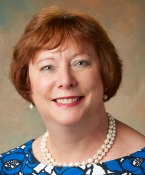Scholar Fridays is a series on Bearings Online where we feature 2018-19 Resident Scholars. Susan Sink recently interviewed Gretchen Van Dyke, Associate Professor of Political Science at The University of Scranton in Scranton, PA. She is spending the academic year at the Collegeville Institute working on a project titled Teaching Mission as a Vocation in the Jesuit Tradition: An Edited Collection Project. To view previous Scholar Friday interviews, click here.

Tell us about your project. What are the major themes you are highlighting in your collection?

Gretchen Van Dyke
I am pleased and honored to spend this sabbatical year here at the Collegeville Institute working on an edited collection project, tentatively titled Teaching Mission as a Vocation in the Jesuit Tradition. This volume will offer a series of case studies that presents how faculty in Jesuit colleges and universities, and possibly others who have been influenced by Jesuit education, practice their disciplinary expertise in classroom settings while also engaging students in fundamental principles of Ignatian spirituality and Jesuit education—all as part of their vocational commitment in Jesuit and Christian higher education today. This project builds upon my own experiences as a political science faculty member at The University of Scranton since 1994. It also connects directly to my equally long-term involvement in the Lilly Fellows Program in Humanities and the Arts (the LFP).
Fellow Resident Scholars Mark Schwehn and Dorothy Bass are working on projects related to vocation and, like you, are putting together a collection of texts that speak to that topic. How has your work with Lilly influenced your thinking about vocation and mission on a Catholic university campus?
My involvement in the LFP network has help me understand more completely and deeply the value and impact of Mark Schwehn’s fundamental intellectual perspective and prescription on vocation in the Christian academy. There is a direct correlation between Schwehn’s presentation of academic vocation in the Christian/Protestant tradition and the meaning of academic vocation stemming from Ignatian roots and found distinctively in Jesuit educational institutions and experiences. That linkage is the root of this sabbatical project that has brought me here to the Collegeville Institute.
Such a dialogue is even more essential in this era of corporatization in American higher education.
I perceive great value in and need for pursuing such a volume, to continue deepening the cross-denominational and ecumenical connectedness that the LFP consistently endeavors to develop, and possibly to advance and enhance new dialogue about mission and academic vocation across the broader scope of church-related higher education. Such a dialogue is even more essential in this era of corporatization in American higher education, in which the student more than ever is considered the consumer of the knowledge and skills provided by the educational producer (we, the university faculty!).
You are quoted as arguing that Pope John XXIII’s 1963 encyclical Pacem in Terris is “one of the most powerful prescriptions for building world peace.” Why is this document important to you?
When I teach Pacem in Terris, some of my students have argued that while the Pope was well meaning, he was naïve – that we will never see his prescription come to reality. Some have even argued that popes should refrain from commenting on such politically-charged topics! In such assessments, their cynicism about the political world clearly has overrun their capacity for hope. I try to help student see that St. John XXIII’s argument is much more than a simplistic “pipe dream” and there is validity to his hopeful prescription, especially if we connect it to the teachings of Jesus Christ in the Gospels. That certainly should be the case in an institution like The University of Scranton, whose mission is deeply rooted in Catholic and Jesuit principles and values.
This is an interesting time to be a political scientist. What are your thoughts about the current state of politics in the country? How is it affecting your students and how are you trying to prepare them for the responsibilities of active citizenship?
As I routinely say to anyone who offers that comment: it is always an “interesting time” to be a political scientist and to teach what I truly love—politics! As I also say, I primarily teach the world, which I also love and find so intriguing in so many different ways, even if its pain and suffering can break one’s heart on a daily basis. At the moment, I do find it disturbing that our internal politics seem so fractured, because the lack of responsible political collaboration means it is that much more difficult to reach the consensus decision-making necessary for effective public policy—not just for the American people but to ensure effective American leadership in an equally fractured world. The world really does need American participation in multilateral initiatives to build a more just and peaceful global community.
That we have virtually 24-7 instant access to information through our various electronic devices may not necessarily be a good thing, especially when our capacities for assessing the truthfulness or inaccuracy—or even deliberate dishonesty—of that vast amount of information is compromised by individual idiosyncrasies (such as inherent political bias or lack of effective analytical skills). In such challenging times, I am among a group of faculty on my campus who realize that students have a really difficult time engaging in true and effective political discourse and debate, precisely because one is so often questioning the validity of the other person’s information. Further, students so often also do not want “to offend” their peers, fearing the personal implications of doing so; thus, they often choose to remain silent, either not countering misinformation and/or not participating in critical oral discussions and debate about serious current national and international events.
This challenge of information illiteracy is at the root of my students’ “disengagement” in civil civic dialogue.
For me, this challenge of information illiteracy is at the root of my students’ “disengagement” in civil civic dialogue. This has serious implications for the longer term health and well-being of the civic society in which my students will find themselves. Like many in my own discipline, I worry deeply about such civic disengagement and have supported utilizing creative pedagogical tools and experiential learning techniques (such as simulations) to encourage students’ capacities for civic education and engagement on current political issues and events. Further, I look to foster their understanding of what it means to be lifelong citizens of our national and global communities, and encourage them to think about using their intellectual training and gifts for careers in public service and leadership in civic society.
What has stood out about your experience of the Collegeville Institute and the campus communities (Abbey and University) so far?
Besides the lovely rural setting and the peacefulness of this place, the real highpoint for me thus far has been the profound sense of collegiality and community that has permeated my experience here. I have found our weekly seminars intellectually stimulating and rich. I very much appreciate the array of academic and professional expertise represented by my fellow scholars, and the fantastic discussions we have shared—about wide ranging topics, some of which have been enhanced that much further by members of the Abbey and colleagues from the University community.
I appreciate equally the commitment to spirituality that forms the foundation from which my fellow scholars pursue their intellectual and creative work
Yet, I appreciate equally the commitment to spirituality that forms the foundation from which my fellow scholars pursue their intellectual and creative work—whether it be as a professor or a minister, a scholarly academic or professional writer—or poet, or a practicing Benedictine or Buddhist monk. Our weekly seminars always begin with a short prayer service/reflection in the tradition of the seminar leader for that week. During our less formal Friday evening dinners (and in numerous informal and often impromptu social gatherings in between!), our conversations often have included issues related to spirituality and spiritual practices, sometimes tied to current events, other times to deep theological and/or philosophical debates, and at other moments connected to personal stories about family, colleagues and friends near and far, students, travels, and countless life experiences.
This environment of intellectual and spiritual collegiality, friendship, and companionship is proving to be life-giving to me, both professionally and personally. I am deeply grateful to the Collegeville Institute for granting me this time and place to spend my sabbatical year.
Like this post? Subscribe to have new posts sent to you by email the same day they are posted.



Leave a Reply